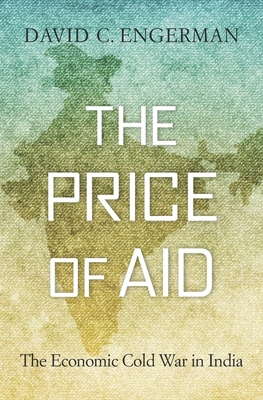

 Harvard University Press
Harvard University Press
The Price of Aid: The Economic Cold War in India


Key Metrics
- David C Engerman
- Harvard University Press
- Hardcover
- 9780674659599
- 9.5 X 6.4 X 1.6 inches
- 1.9 pounds
- History > Asia - India & South Asia
- English
 Secure Transaction
Secure TransactionBook Description
Debates over foreign aid can seem strangely innocent of history. Economists argue about effectiveness and measurement--how to make aid work. Meanwhile, critics in donor countries bemoan what they see as money wasted on corrupt tycoons or unworthy recipients. What most ignore is the essentially political character of foreign aid. Looking back to the origins and evolution of foreign aid during the Cold War, David C. Engerman invites us to recognize the strategic thinking at the heart of development assistance--as well as the political costs.
In The Price of Aid, Engerman argues that superpowers turned to foreign aid as a tool of the Cold War. India, the largest of the ex-colonies, stood at the center of American and Soviet aid competition. Officials of both superpowers saw development aid as an instrument for pursuing geopolitics through economic means. But Indian officials had different ideas, seeking superpower aid to advance their own economic visions, thus bringing external resources into domestic debates about India's economic future. Drawing on an expansive set of documents, many recently declassified, from seven countries, Engerman reconstructs a story of Indian leaders using Cold War competition to win battles at home, but in the process eroding the Indian state.
The Indian case provides an instructive model today. As China spends freely in Africa, the political stakes of foreign aid are rising once again.
Author Bio
David C. Engerman is a scholar of twentieth-century international history.
Building on his dual training in American and Russian/Soviet history at the University of California-Berkeley (where he received his Ph.D. in 1998), he wrote two books on the place of Russia and the USSR in American intellectual and political life: Modernization from the Other Shore: American Intellectuals and the Romance of Russian Development (Harvard UP, 2003) and Know Your Enemy: The Rise and Fall of America’s Soviet Experts (Oxford UP, 2009).
He has also researched and written on a variety of topics related to the history of development assistance, including a co-edited volume, Staging Growth: Modernization, Development and the Global Cold War (U-Mass Press, 2003), and most recently a monograph, The Price of Aid: The Economic Cold War in India (Harvard UP, 2018).
This research was also the topic of his presidential address for the Society for Historians of American Foreign Relations in 2016. Research for The Price of Aid was supported by grants and fellowships from the American Council of Learned Societies, the American Institute of Indian Studies, the American Philosophical Society, the Guggenheim Foundation, the Kennan Institute for Advanced Russian Studies, the National Council for Eurasian and East European Studies, the National Endowment for the Humanities, and the Eisenhower, Johnson and Truman presidential libraries.
Engerman joins the faculty at Yale after nineteen years at Brandeis University. His new research focuses on the geopolitics of international economic inequality in the second half of the twentieth century.
Source: Yale University
Community reviews
Write a ReviewNo Community reviews


